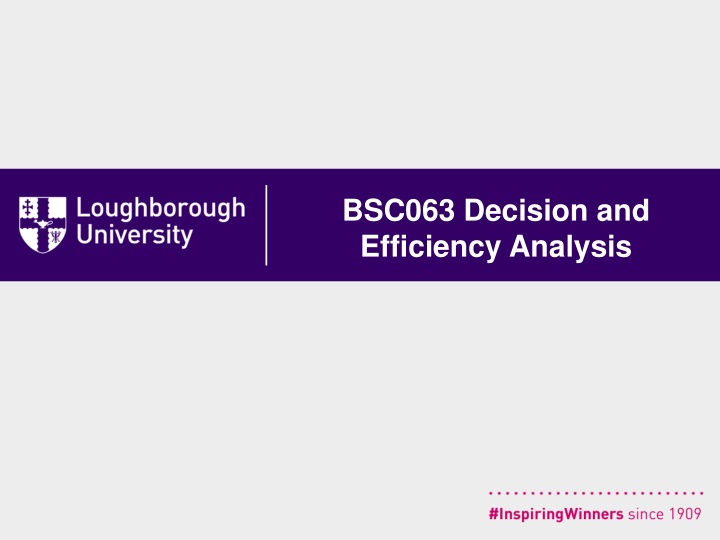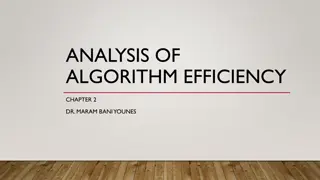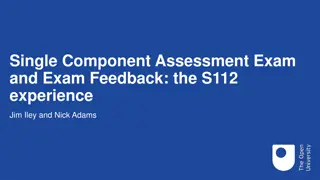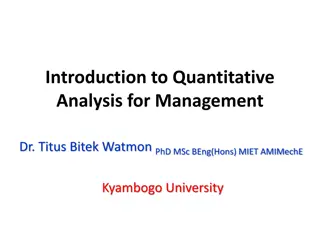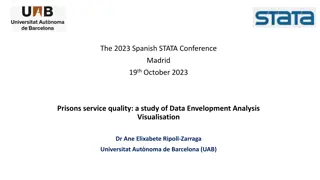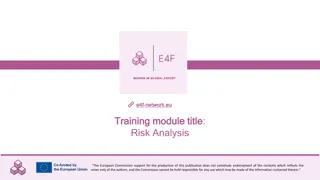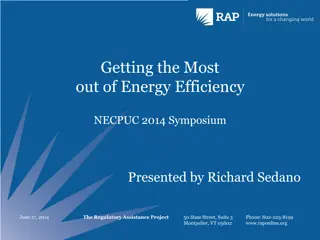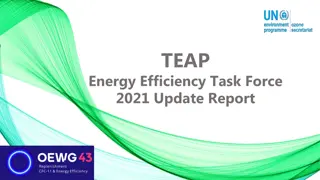Decision and Efficiency Analysis Module Overview
Gain insights into decision-making in complex business and policy settings, enhance skills in modelling decision problems, learn efficiency analysis techniques, and understand the application of data envelopment analysis. The module includes lectures, problem classes, assessments, and practical applications to equip students with the tools needed to excel in decision and efficiency analysis. Dive into topics like goal programming, DEA methodology, and more to make informed decisions and boost organizational productivity.
Download Presentation

Please find below an Image/Link to download the presentation.
The content on the website is provided AS IS for your information and personal use only. It may not be sold, licensed, or shared on other websites without obtaining consent from the author.If you encounter any issues during the download, it is possible that the publisher has removed the file from their server.
You are allowed to download the files provided on this website for personal or commercial use, subject to the condition that they are used lawfully. All files are the property of their respective owners.
The content on the website is provided AS IS for your information and personal use only. It may not be sold, licensed, or shared on other websites without obtaining consent from the author.
E N D
Presentation Transcript
BSC063 Decision and Efficiency Analysis
About This Module This module gives students a good understanding of how to make decisions in complex business and policy making situations. The students will develop skills in modelling decision and efficiency analysis problems. The module aims to provide not only rigorous academic understanding of complex practical issues but also hands-on experience with the use of computers for decision and efficiency analysis in a business or policy environment.
Teaching and Learning The module consists of two groups of topics Decision analysis. This involves understanding different types of decision problems with multiple objectives, goal programming and game theoretic approaches. Efficiency analysis. This area is devoted to the assessment of productivity, performance and efficiency of organisations. Examples of organisations to which this methodology is applicable include bank branches, supermarkets, hospitals, schools, and so on. The module primarily focuses on the methodology known as data envelopment analysis (DEA). This technique relies on linear programming as the main modelling method.
Teaching and Learning There are 2 lectures every week and 1 problem class every other week. The lectures include introduction of new methodology topics, supported by computer demonstrations of different solution methods. Problem classes are similar to lectures but do not usually include any new material, instead focussing on solving and discussing different problems, including exam-style problems.
Assessment and Feedback The module is assessed by a 2-hour exam (100% of the module mark) The exam includes questions on different topics of decision and efficiency analysis. Examples of such questions are discussed in the class throughout the module. Generic Exam Feedback will be made available to all students.
Wider skills and knowledge development This module shows how management science can make a difference in the real world, by helping make well-informed business and policy decisions in complex situations. The students will learn how to use software and communicate results of analysis to the managers and policy makers.
Reading material The best and most comprehensive textbook on this module is: Cooper, Seiford and Tone (published in different years, e.g., 2006, 2007) Data Envelopment Analysis: A Comprehensive Text with Models, Applications, References and DEA-Solver Software. There is also a wealth of useful material on http://www.deazone.com This site contains a huge amount of information, e.g., tutorials and further reading.
Why choose this module? This module is great for those who want to find out how to evaluate the efficiency of companies and other organisations, make business and policy decisions based on data, and also, very importantly, want to make use of their knowledge of linear programming and other management science techniques. For further information please contact Dr Nikos Argyris, the module leader, on n.argyris@lboro.ac.uk
